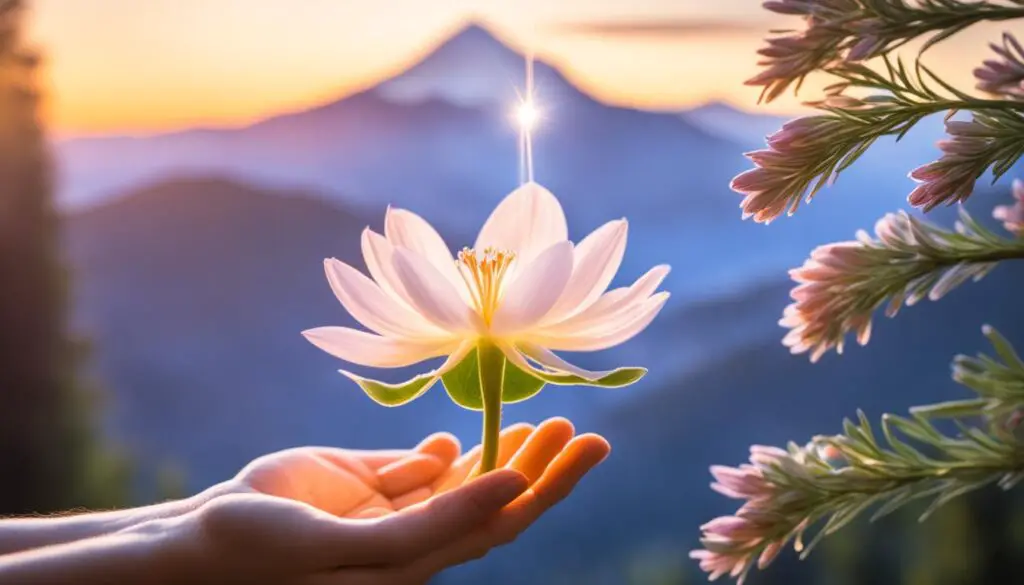In our fast-paced world, many people are seeking a deeper sense of fulfillment and purpose beyond material achievements. They are finding solace and inspiration in exploring their spirituality, a journey that offers profound insights and a connection to something greater than themselves.
Connecting with spirituality is about embracing the essence of who we are and understanding our place in the world. It involves a journey of self-discovery, self-reflection, and self-awareness. Through practices like meditation, mindfulness, and embracing spiritual teachings, we can unlock the doors to a deeper understanding of ourselves and the world around us.
Embracing spirituality is not limited to any particular religion or belief system. It is a personal exploration that transcends boundaries and allows individuals to connect with their inner selves. It is a means of finding peace, meaning, and purpose in life.
By embracing spirituality, we embark on a transformative journey that opens our hearts, minds, and souls to a greater understanding of ourselves and the world. It is a path of self-discovery, growth, and self-realization that enriches every aspect of our lives.
Key Takeaways:
- Connecting with spirituality offers profound insights and a deeper sense of fulfillment.
- Practices like meditation, mindfulness, and self-reflection can deepen our spiritual connection.
- Spirituality is a personal exploration that transcends boundaries and allows for self-discovery.
- Embracing spirituality brings peace, meaning, and purpose to our lives.
- It is a transformative journey that enriches every aspect of our being.
Rediscovering the Inner Self
Spirituality invites us to embark on a journey of self-discovery. It encourages introspection and reconnecting with our inner being. Through practices like meditation, mindfulness, and self-reflection, we can unlock a deeper understanding of who we truly are and experience spiritual growth and development.
Deepening our spiritual practice allows us to delve into the depths of our soul, peeling away layers of conditioning and societal expectations. It is a process of shedding the masks we wear and embracing our true essence. By carving out moments of solitude and silence, we create space to listen to the whispers of our inner self.
Meditation, in particular, plays a pivotal role in this journey of self-exploration. It helps us quiet the turbulences of the mind, allowing us to tap into our inner wisdom and connect with the divine source within us. Through regular meditation practice, we deepen our spiritual connection, gain clarity, and cultivate inner peace.
Embracing the silence within ourselves is key to understanding the infinite possibilities contained within our being.
Self-reflection and mindfulness complement our meditation practice by bringing awareness to our thoughts, emotions, and actions. By observing ourselves without judgment, we gain insight into our patterns, behaviors, and beliefs. This heightened self-awareness offers an opportunity for growth, allowing us to make conscious choices aligned with our true values and aspirations.
The journey of rediscovering the inner self is not always easy. It requires courage to face our fears, unravel our shadows, and embrace our vulnerabilities. However, the rewards are immeasurable. As we peel away the layers, we discover the essence of our being, the core of our existence.
| Benefits of Rediscovering the Inner Self |
|---|
| 1. Spiritual growth and development |
| 2. Enhanced self-awareness |
| 3. Increased clarity and alignment with personal values |
| 4. Discovering innate strengths and talents |
| 5. Cultivating inner peace and contentment |
| 6. Deeper connection with the divine source |
| 7. Heightened intuition and inner guidance |
Rediscovering the inner self is a lifelong journey, a continuous process of growth and transformation. It is an exploration of our true essence, a remembrance of our interconnectedness with all living beings and the cosmos itself. Through deepening our spiritual practice, we step into the fullest expression of who we are and embark on a path of self-mastery and spiritual awakening.
The Power of Gratitude
Gratitude is a powerful practice that can have a transformative impact on our lives. When we cultivate gratitude, we shift our focus from what is lacking to what is present, opening our hearts to a sense of abundance and positivity.
Expressing gratitude allows us to appreciate the blessings and opportunities that surround us each day. It is a way of acknowledging the goodness in our lives and recognizing the efforts and kindness of others.
“Gratitude turns what we have into enough.” – Anonymous
Gratitude not only enhances our personal well-being but also strengthens our connection to the world around us. It reminds us of the interconnectedness of all beings and fosters a sense of empathy and compassion.
When we practice gratitude regularly, we become more attuned to the little joys and moments of beauty that exist in our daily lives. We develop a greater appreciation for nature, for the kindness of strangers, and for the simple pleasures that bring us happiness.
The Science Behind Gratitude
Research has shown that practicing gratitude has numerous benefits for our mental and physical health. Studies have found that people who regularly express gratitude experience lower levels of stress, anxiety, and depression.
Gratitude also promotes better sleep, boosts immune function, and decreases symptoms of chronic pain. When we cultivate gratitude, we are more likely to engage in self-care practices and make healthier lifestyle choices.
In addition, gratitude strengthens our relationships with others. When we express gratitude towards those around us, it fosters a sense of connection and deepens our bonds. It helps us appreciate the support and love we receive and encourages us to pay it forward.
A Daily Gratitude Practice
One way to cultivate gratitude is through a daily gratitude practice. This can involve keeping a gratitude journal, where you write down three things you are grateful for each day. It can also include offering silent gratitude prayers, expressing thanks to loved ones, or even just pausing to appreciate the moment.
A table outlining a suggested daily gratitude practice:
| Morning | Noon | Evening |
|---|---|---|
| Give thanks for a new day | Express gratitude for a meal or snack | Reflect on the positive moments of the day |
| Set intentions for the day with gratitude | Appreciate a moment of rest or relaxation | Express gratitude for relationships and connections |
| Count blessings and affirm gratitude | Find gratitude in the midst of work or tasks | Show appreciation for acts of kindness |
Remember, gratitude is a practice that can be cultivated and nurtured. By making gratitude a part of our daily lives, we can experience greater joy, contentment, and a deeper connection to ourselves and the world around us.

Embracing Impermanence
In the journey of spirituality, one of the fundamental teachings is the embracing of impermanence. Life is ever-changing, and embracing this truth allows us to find peace and freedom amidst the constant flux. By letting go of attachments and embracing the present moment, we can unlock a profound sense of serenity and live more fully.
Impermanence reminds us that everything in life is transient. Relationships, possessions, and even our own physical bodies are subject to change. Instead of clinging to what is impermanent, spirituality urges us to cultivate a mindset of non-attachment. Letting go of attachments liberates us from the chains of desire and expectation, allowing us to experience the beauty of life as it unfolds.
When we release our attachment to outcomes and possessions, we open ourselves to the flow of life. We become more adaptable and resilient, better equipped to navigate the challenges that come our way. Embracing impermanence teaches us to find peace in the midst of uncertainty, to embrace change as an opportunity for growth and transformation.
Letting go gives us the freedom to embrace the present moment and experience life fully.
The present moment is where true peace resides. By embracing impermanence and letting go of attachments, we find ourselves fully present in each moment. We awaken to the richness of life and appreciate the simple joys that surround us. Instead of dwelling on the past or anxiously anticipating the future, we learn to fully engage with the present moment, savoring each experience.
When we embrace impermanence, we discover a profound sense of freedom. The chains of attachment no longer bind us, and we are able to live with a lighter heart and mind. We become more open to new possibilities and experiences, unencumbered by the weight of attachments. Embracing impermanence allows us to dance with life, to flow with its ever-changing rhythms.
The Benefits of Embracing Impermanence
Embracing impermanence offers numerous benefits to our overall well-being and spiritual growth:
- Peace and Tranquility: Letting go of attachments brings inner peace and tranquility, as we release the need to control and possess.
- Greater Freedom: Non-attachment frees us from the limitations of material possessions, societal expectations, and rigid beliefs.
- Presence and Mindfulness: Embracing impermanence allows us to be fully present and practice mindfulness, enhancing our connection to the present moment.
- Detachment from Outcome: We become less focused on outcomes and more focused on the process, allowing us to navigate life with greater ease and acceptance.

In conclusion, embracing impermanence is a transformative practice that leads to peace, freedom, and a deeper connection to the present moment. By letting go of attachments and embracing the transient nature of life, we cultivate a mindset of acceptance, resilience, and profound inner peace.
Cultivating Compassion
Compassion lies at the heart of spirituality. It is the empathetic understanding and kindness that we extend towards ourselves and others, fostering deep connections and healing. Through the practice of compassion, we nurture our capacity for understanding, forgiveness, and unconditional love, bringing profound healing to our souls.
Cultivating compassion begins with the realization that we are all interconnected, sharing the human experience. It involves recognizing the common thread that binds us and embracing the vulnerability and imperfections that make us human. When we approach ourselves and others with compassion, we create a safe space for growth, understanding, and transformation.
The Power of Understanding
Understanding is a key component of compassion. It involves shifting our perspective to place ourselves in someone else’s shoes, seeking to comprehend their experience, emotions, and challenges. By actively listening and empathizing, we bridge the gap between ourselves and others, fostering deeper connections and meaningful relationships.
When we truly understand another person’s struggles, we can respond with empathy and kindness, paving the way for healing and growth.
Forgiveness: A Path to Freedom
Forgiveness is an integral part of cultivating compassion. It is the act of releasing resentment and anger towards ourselves and others, freeing ourselves from the burden of carrying grudges. By forgiving, we acknowledge the humanity in others and ourselves, offering a chance for renewal and personal liberation.
Forgiveness liberates us from the shackles of the past, allowing us to move forward with love and understanding.
Unconditional Love: A Healing Force
Unconditional love encompasses acceptance, non-judgment, and care for ourselves and the world around us. It is the purest form of compassion, transcending external circumstances and embracing the inherent worth and dignity of every being. When we cultivate unconditional love, we tap into a powerful healing force that fosters unity, connection, and harmony.
Unconditional love has the power to transform lives, bringing healing and restoration to broken spirits.
The Healing Power of Compassion
Compassion serves as a catalyst for healing. It soothes emotional wounds, fosters inner peace, and promotes overall well-being. When we practice compassion, we create an environment where understanding, forgiveness, and unconditional love thrive, paving the way for personal growth and profound transformation.

| Benefits of Cultivating Compassion | How Compassion Can Transform Lives |
|---|---|
| Promotes empathy and understanding | Builds stronger and more authentic relationships |
| Fosters emotional well-being | Reduces stress and anxiety levels |
| Enhances self-compassion and self-acceptance | Improves self-esteem and self-worth |
| Encourages forgiveness and release of negative emotions | Helps break the cycle of anger and resentment |
| Brings joy and fulfillment | Increases overall life satisfaction |
Connecting with the Divine
Spirituality often involves seeking a connection with something greater than ourselves. This connection can be found through religion, nature, or a universal force. Exploring different paths of spiritual connection leads to a deeper understanding of higher consciousness and can ignite a spiritual awakening.
Whether it’s through prayer, meditation, or communing with nature, connecting with the divine allows us to tap into a higher realm of consciousness. This connection transcends our everyday experiences and opens up a gateway to spiritual awakening.
When we connect with the divine, we awaken to a profound sense of purpose and meaning in life. We begin to see the interconnectedness of all things and recognize our role in the grand tapestry of existence.

Just as a drop of water merges with the vast ocean, our individual consciousness merges with the universal consciousness, expanding our awareness and expanding our view of the world.
“When we discover the divinity within, we realize that we are not separate from the divine but an integral part of it.”
Exploring different paths of spiritual connection leads to a deeper understanding of higher consciousness and can ignite a spiritual awakening.
Through connecting with the divine, we awaken our innate wisdom and intuition. We gain clarity and guidance in navigating life’s challenges, leading to a greater sense of peace, harmony, and purpose.
Unleashing the Power of Connection
Connecting with the divine nourishes our souls and re-ignites our spirits. It aligns us with the universal flow and allows us to access higher realms of consciousness and knowledge.
By deepening our connection with the divine, we open ourselves to the transformative power of spiritual awakening. We become vessels for love, compassion, and wisdom, radiating these qualities into the world.
Table: Pathways to Spiritual Connection
| Pathways | Description |
|---|---|
| Meditation | A practice that calms the mind and opens the doorway to spiritual insights and connection. |
| Prayer | A way to communicate with the divine, expressing gratitude, seeking guidance, and connecting with higher realms. |
| Nature | Connecting with the natural world, its beauty, and its wisdom as a means of connecting with the divine. |
| Rituals | Ceremonial acts, often found in religious traditions, that create a sacred space for connecting with the divine. |
Each individual’s journey of connecting with the divine is unique. Some may find solace and connection within organized religious settings, while others may discover their spiritual connection through personal practices and experiences.
Regardless of the pathway we choose, the destination remains the same – a profound connection with higher consciousness and a spiritual awakening that transforms our lives.
Benefits of Embracing Spiritualism
Embracing spirituality offers numerous benefits that positively impact our well-being and relationships. By incorporating spiritual practices into our lives, we can effectively cope with stress and anxiety, improve our mental and physical health, and experience a deep sense of peace and calmness.
Spirituality provides a holistic approach to wellness, recognizing the intricate connection between the mind, body, and spirit. Engaging in activities such as meditation, prayer, or mindfulness can reduce stress levels, promote relaxation, and enhance overall mental well-being. These practices enable us to cultivate a greater awareness of our emotions and thoughts, allowing for better coping mechanisms when faced with challenges.
Embracing spirituality helps us cope with stress, improve mental and physical health, and find peace in our daily lives.
Furthermore, the pursuit of spirituality promotes a heightened sense of self-awareness and personal growth. It encourages introspection and reflection, allowing us to gain deeper insights into our values, beliefs, and purpose in life. This self-discovery journey contributes to a strengthened sense of identity and a more authentic connection to ourselves and the world around us.
One of the profound benefits of embracing spiritualism is the cultivation of peace and calmness. Spiritual practices often involve mindfulness and being present in the moment, which can alleviate the anxieties of the past and future. By grounding ourselves in the present, we create space for peace and tranquility to flow into our lives.
Improved Relationships
Additionally, embracing spirituality can positively impact our relationships. When we connect with our spiritual selves, we cultivate qualities such as compassion, empathy, and forgiveness, which are essential for fostering healthy and harmonious connections with others. By operating from a place of unconditional love and understanding, we create a solid foundation for strengthened relationships.
Moreover, spirituality encourages us to embrace a broader perspective and recognize the inherent interconnectedness of all beings. This realization promotes tolerance, acceptance, and respect for diversity, leading to improved interactions and a sense of unity within our communities.

| Benefits of Embracing Spiritualism | How It Contributes to Well-being |
|---|---|
| Coping with stress and anxiety | Reduces stress levels, promotes relaxation |
| Improved mental and physical health | Enhances overall well-being, reduces symptoms of depression and anxiety |
| Peace and calmness | Facilitates mindfulness and being present in the moment, alleviating anxieties |
| Strengthened relationships | Cultivates compassion, empathy, forgiveness, and unconditional love |
Conclusion
Embarking on a spiritual journey is a transformative experience that invites us to explore the depths of our being. It is a path of self-discovery and personal growth, where we delvе into the realms of spirituality, connection, and purpose. Through practices like meditation, mindfulness, and self-reflection, we nurture a deeper connection to ourselves and the world around us.
By embracing spirituality, we embark on a profound journey of personal growth. We peel back the layers of ego and societal conditioning to uncover our true essence. This process not only brings us closer to ourselves but also allows us to cultivate a greater sense of compassion, understanding, and forgiveness.
Connecting with our spirituality brings us into alignment with the divine energy that permeates all of creation. It awakens us to the beauty and interconnectedness of the world, reminding us that we are all part of a greater whole. This connection brings peace, joy, and a renewed sense of purpose to our lives.
As we continue our spiritual journey, we open ourselves to a world of possibilities. We deepen our understanding of the mysteries of life, embrace impermanence with grace, and cultivate gratitude for the present moment. Our spiritual journey becomes a lifelong endeavor, guiding us towards the uncharted territories of personal growth and a profound connection to ourselves and the world.
FAQ
How can spirituality help in self-discovery?
Spirituality encourages introspection and reconnecting with our inner being through practices like meditation, mindfulness, and self-reflection. These practices unlock a deeper understanding of who we truly are and facilitate spiritual growth and development.
What is the power of gratitude in spirituality?
Cultivating gratitude is a profound practice that shifts our focus from what is lacking to what is present. It opens our hearts to a sense of abundance, enhances personal well-being, and strengthens our connection to the world around us.
How does spirituality help in embracing impermanence?
Spirituality teaches us to let go of attachments and embrace the impermanence of life. By accepting the transient nature of existence, we find peace amidst the ebb and flow of life and unlock a profound sense of freedom in the present moment.
How does compassion play a role in spirituality?
Compassion lies at the heart of spirituality. It encourages us to extend kindness, empathy, understanding, forgiveness, and unconditional love towards ourselves and others. Cultivating compassion brings profound healing to our souls.
How can spirituality help in connecting with higher consciousness?
Spirituality involves seeking a connection with something greater than ourselves. This connection can be found through religion, nature, or a universal force. Exploring different paths of spiritual connection leads to a deeper understanding of higher consciousness and can ignite a spiritual awakening.
What are the benefits of embracing spirituality?
Embracing spirituality helps us cope with stress and anxiety, improves our mental and physical health, enhances our overall well-being, brings peace and calmness to our minds, and strengthens our relationships with others.
How does spirituality contribute to personal growth?
Embarking on a spiritual journey is a transformative experience that offers profound insights and a deeper connection to ourselves and the world around us. By embracing spirituality, we can cultivate personal growth, enrich our daily lives, and uncover the beauty of connecting with our spirituality.








